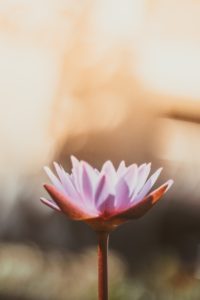Lifestyle
“It's a mental cleansing process by self-will and whatever the garbage of the day is, it must pass through as negative and you must cut it with a mantra and make it positive.”
Yogi Bhajan
As Yogi Bhajan put it himself, the point of meditation practice is not simply to feel good. It holds within it a far deeper meaning than that. It is about cleansing your mind and ridding yourself of any negativity that you may have. Needless to say, this process is not one that comes naturally to everyone who embarks upon it. Some may have difficulty. Thankfully, you may find that using essential oils offers a helping hand.
Why Should You Use Essential Oils for Meditation?
Using essential oils for meditation is one way to make this process smoother. The fragrant and relaxing scents of the oils help to focus and calm the mind. Achieving this state of ultimate peacefulness means letting go of all the earthly distractions that surround you. Taking in the scent of these relaxing oils will allow you to more easily reach zen.
The Very Best Essential Oils
Wondering how to use essential oils for meditation? Let’s take a look at what each oil has to offer and how you can use it when you first start out.
1. Sandalwood
With a natural, woody yet sweet fragrance, the scent of sandalwood is unmistakable. This type of wood is often used as a part of the meditation practice. The essential oil should help students to stay alert and focus on their innate desires while they are meditating.
2. Myrrh
Myrrh is actually a tree resin but its essential oil holds great value. The powerful, woody scent can help you to gain focus when you’re trying to enter the meditative state.
3. Palo Santo
Derived from a South American tree, palo santo oil should be on your next shopping list. With a complex and woody fragrance, this essential oil may help you to concentrate. It is believed to have a spiritual nature and, indeed, the name of it translates to “holy wood”.
4. Lavender
The sweet scent of lavender can help you to relax after a long, hard day at work. This is also one of the best essential oils for meditation. Using it as a part of your session will create a peaceful atmosphere and environment.
5. Clary Sage
The clary sage plant is a fragrant one that blooms with stunning purple flowers. The oil from this flower boasts rather remarkable stress-relieving properties. Expect to feel relaxed when using this oil.
6. Ylang Ylang
Famous for reducing tension in the body and relieving stress, ylang ylang is one of the greatest essential oils for meditation. The irresistible scent is as sweet as it is tempting.
7. Chamomile
Peace and tranquility are aptly combined in chamomile essential oil. Should you find that it’s hard to get into the meditative state, this is the essential oil for you.
8. Rose
Perhaps one of the most romantic essential oils for meditation, rose is all about love. This sweetly scented oil has a multitude of benefits. Many people believe that the fragrance of this oil helps students to have a greater sense of compassion and love for themselves.
9. Cistus
As warm as it is spiced, cistus essential oil is certain to help with your meditation process when you first start. The oil is believed to help elevate the mind and bring you freely into a space of harmony and relaxation.
10. Jasmine
The intoxicating fragrance of jasmine has always been associated with spirituality. Using it within your meditation will allow you to unwind without ever slipping into a drowsy state.
11. Frankincense
Frankincense is an ancient essential oil that you ought to be using regularly. The oil promotes a sense of refreshment and concentration. If you need to stay entirely focused during your session, try using this scent now.
12. Neroli
Made from the blossoms of a tree, neroli is one of the less popular essential oils for meditation. However, you shouldn’t overlook it when it comes to your practice. The oil helps to open the mind and relieve feelings of depression and low moods.
13. Peppermint
Fresh and enticing, peppermint is a well-known scent with which you will be familiar. It is also one of the most relaxing fragrances you can use when you are meditating. Try using it at the start of your sessions to unwind.
14. Orange
Citrus scents offer a powerful level of energy. The sweet smell of oranges can help to lift your mood and make you feel light and airy. This fantastic sensation will help you when you’re embarking on a meditative journey.
15. Patchouli
Originating in the tropical areas of Asia, patchouli is a part of the “deadnettle” family of plants. The essential oil which people extract from this plant is ideal for meditation. Helping you find your center and achieving a state of calm, it’s a must-use fragrance.
16. Lemon
Lemon is another citrus fragrance that you should use as a part of your meditation. If you’re struggling with alertness, using this sweet and subtle oil could help you to stay awake and maintain your focus while you are meditating.
How to Use Essential Oils for Meditation
Now that you have an idea of the best essential oils for meditation, let’s take a moment to learn how to use them. There are a few options available here. Perhaps the most popular option is to use a diffuser. You can get either a candle or steam diffuser, depending on what works for you. However, if you’d like to try something a bit different, you can also use a spray mist to scent an entire room too.
Conclusion
Using essential oils for meditation doesn’t have to be a challenge. These fragrant an enticing scents help you to elevate your process to a whole new level. If you have currently been searching for a way to enhance your sessions, you might just have found it. Within this guide, we’ve given you the basic tools to get started. Be sure to do some research of your own before you give these oils a try for yourself.





